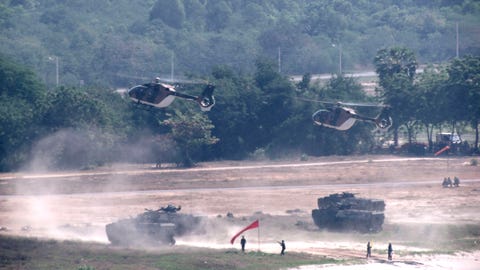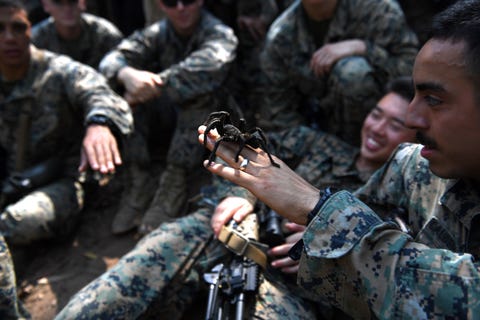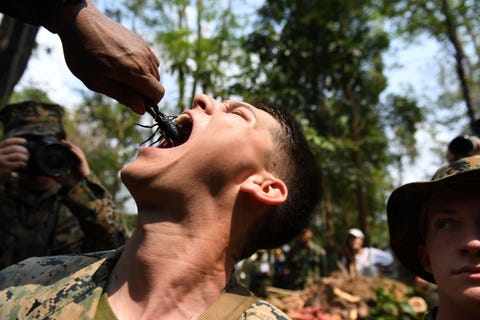One of the most time-honored (and bloody) traditions in a longstanding military exercise is now history.
Soldiers and Marines attending the annual Cobra Gold military exercises in Thailand will no longer eat or drink parts of live animals—including the customary cobra blood from freshly slaughtered snakes. Critics like People for the Ethical Treatment of Animals (PETA), the outspoken nonprofit dedicated to animal rights, condemned the practice as “barbaric.”

In a series of complaints to the U.S. Marine Corps, beginning in March 2020, PETA claimed that the practice was not only illegal under military law, but that it could also cause diseases to jump from animals to humans. Citing the U.S. Centers for Disease Control and Prevention, PETA noted that “approximately 75 percent of recently emerging infectious diseases affecting people began as diseases in animals.” The U.S. Marine Corp service did not immediately respond to a request for comment.
Cobra Gold is one of the oldest multinational exercises in the world. The exercises first began in 1982 as a way to reassure America’s allies that it was still a major player in southeast Asia. Participants include the United States, Thailand, Singapore, Malaysia, Australia, South Korea, and Japan, with more than a dozen observer nations. The U.S. contingent typically consists of Navy and Marine forces, and includes both amphibious landings and valuable jungle training.

One key—and objectively very gross—aspect of the jungle training is the survival food exhibition that Royal Thai Army survival experts hold each year. Participants, including a large number of Marines, eat wild foods often found in southeast Asian jungles. That includes pineapples and jackfruit, but also animal specimens, including scorpions, tarantulas, and snakes. One famous highlight of the exhibition is the beheading of live cobra snakes, which usually ends with an eager U.S. Marine guzzling down the gushing blood.
But it looks like PETA’s pressure campaign paid off. “I can confirm that we did not kill any animal in CG [Cobra Gold] 2021,” Royal Thai Air Force Lt. Col. Amnuay Kerdkaew told American Military News earlier this week.
In an August 16 blog post applauding that move, PETA stated that the survival aspect of Cobra Gold was a “frat-like party masquerading as training.” It complained about participants “killing chickens with their bare hands, skinning and eating live geckos, consuming live scorpions and tarantulas, decapitating cobras and drinking their blood, and otherwise reveling in the ritualistic killing and consumption of animals.”

PETA also believes the killing of live animals could be illegal under the Uniform Code of Military Justice (UCMJ), the military law that all U.S. service members must abide by. In a March 2020 letter to the Navy’s Inspector General, PETA argued that “since these acts would violate U.S. cruelty-to-animals laws, they ‘bring discredit upon the armed forces’ and senior commissioned officers who order troops to engage in them have participated in ‘conduct unbecoming an officer and a gentleman.’ These are all in violation of the UCMJ.”
Activists also worried that the killings could pose a risk to the health of participants. PETA Australia warned that “the use of live animals during Cobra Gold poses a risk of spreading zoonotic diseases akin to SARS-CoV-2, endangering troops and the wider public. Viruses like SARS-CoV-2 likely originate in bats and are first transmitted to humans via contact with an intermediate animal host.”
All in all, PETA considers the lack of killings a victory, even if there doesn’t appear to be a formal ban in place at this time.
“PETA applauds Thai and U.S. armed forces for cancelling animal killings during Cobra Gold this year,” the organization said in an email. “This follows a year of intensive campaigning by PETA, and will spare animals decapitation and protect public health. The U.S. Marine Corps has admitted the main objective of the activity has been to build camaraderie, and this goal can be achieved through other means that don’t harm or kill animals.”
Source: Read Full Article